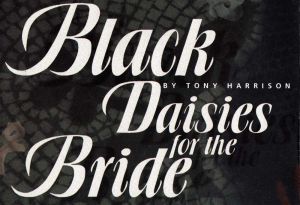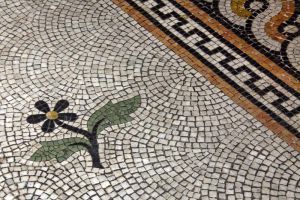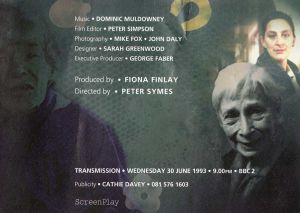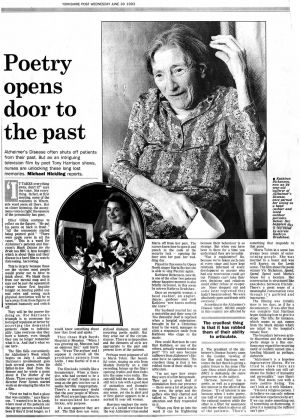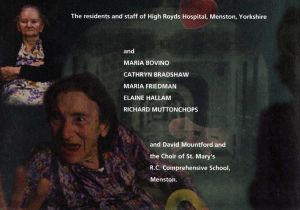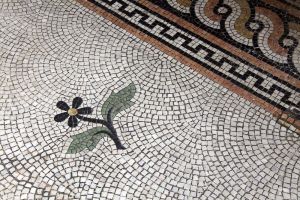A play written by Tony Harrison as a tribute to sufferers of Alzheimer’s disease. The disease affects 600,000 people in Britain. Filmed in High Royds Hospital, Menston,Yorkshire, the play combines drama, documentary, song, verse and music to unravel the lives of the residents. The patients, their families and the staff play themselves
Black Daisies For The Bride
Dir: Peter Symes, 55 mins,UK, 1993
‘The film focuses on three female Alzheimer’s patients, all real, one of them a former opera singer who can now trill only two or three notes from Madame Butterfly. Taking each in turn, the writer Tony Harrison uses their wedding photographs and their life histories to recreate these women as young brides who sing lyrics which encapsulate the feeling of what it must be like to gradually loose your mind to senile dementia. In one startling image, the brides walk majestically down the hospital corridor, their ghostly dresses summoning both the love which they lost when they lost their memories, and the fact that in their futures the aisle can lead them only to ultimate exit. The effect is to draw the viewer into the horrifying world of the Alzheimer’s sufferer, with the skill of Edgar Allen Poe as the film goes way beyond Alzheimer’s to the inevitable fate which we all fear: the void. And believe me it’s as close as you ever want to get. Almost too painful to watch’ Kathryn Holmquist, The Irish Times. ‘This screenplay musical docu-drama is the crowning masterpiece of the recent movement, led by Tony Harrison and director Peter Symes, to reinvent the combination of verse and film.’ The Sunday Telegraph. Black Daisies For the Bride is a unique film tribute to the sufferers of Alzheimer’s Disease and is a collaboration between poet Tony Harrison, director Peter Symes, producer Fiona Finlay and with a specially arranged score by Dominic Muldowney. It won the Documentary Special Prize at the Prix Italia in 1994, and the best drama, Mental Health Media Awards in 1994.
Director
SYMES, Peter
Production Company
BBC
Producer
FINLAY, Fiona
Script
HARRISON, Tony
Music
MULDOWNEY, Dominic
More…
Top five cast
Therapist
HALLAM, Elaine
Young Kathleen
BRADSHAW, Cathryn
Young Maria
BOVINO, Maria
Young Muriel
FRIEDMAN, Maria
Hospital Entertainer
MUTTONCHOPS, Richard
PRIX ITALIA: 1994
Best Documentary – Winner
Tony Harrison is Britain’s principal film and theatre poet and has famously said “Poetry is all I write, whether for books, or readings, or for the National Theatre, or for the opera house and concert hall, or even for TV.” He was born in Leeds in 1937, won a scholarship toLeedsgrammar and read Classics atLeedsUniversity. Harrison’s first two collections of poems The Loiners (1970) and From the School of Eloquence (1978), explore the gulf between his own class background and his education and the powerlessness of the inarticulate – in ‘National Trust’ “the tongueless man gets his land took” In an interview for the Guardian he said “I wanted to write the poetry that people like my parents might respond to.” His work demands to be read aloud, and for him rhyme and rhythm, particularly the Lamb are inspired by English speech patterns and “keeps the connection to the heartbeat”.
Tony Harrison’s success stems from the fact that he is a classicist from the working class; a scholar seeking a mass audience. His most controversial narrative poem ‘v’, prompted by vandals desecrating his parents’ gravestones during the miner’s strike, achieved front page headlines, was broadcast on Channel4 in1987 and won a Royal Television Society Award. Since then, he has continued with his quest to make poetry a public art through the mediums of television and film. Among his film/poems, ‘The Shadow of Hiroshima’ (1995) was screened on Channel 4, the published text won the Heinemann Award and ‘Black Daisies’ won the Prix Italia.
In 1995, he was commissioned by The Guardian to visit Bosnia and write poems about the war. Although “doubtful, in these dark days what poems can do” (‘Initial Illumination’), Harrison once again gives a voice to the inarticulate though poetry, in what he describes as the most ceremonial form of speech. ‘A Cold Coming’ speaks up for the burned corpse of an Iraqi soldier in metrical rhyming couplets – a form that seems to keep hold of sense in such troubled times. In 2007 he was awarded the Wilfred Owen poetry award.
